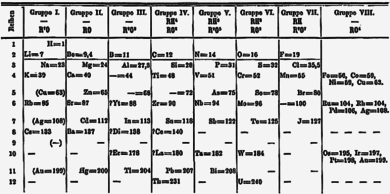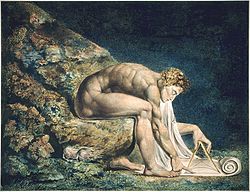Portal:History of science
The History of Science Portal
The history of science covers the development of science from ancient times to the present. It encompasses all three major branches of science: natural, social, and formal. Protoscience, early sciences, and natural philosophies such as alchemy and astrology during the Bronze Age, Iron Age, classical antiquity, and the Middle Ages declined during the early modern period after the establishment of formal disciplines of science in the Age of Enlightenment.
Science's earliest roots can be traced to Ancient Egypt and Mesopotamia around 3000 to 1200 BCE. These civilizations' contributions to mathematics, astronomy, and medicine influenced later Greek natural philosophy of classical antiquity, wherein formal attempts were made to provide explanations of events in the physical world based on natural causes. After the fall of the Western Roman Empire, knowledge of Greek conceptions of the world deteriorated in Latin-speaking Western Europe during the early centuries (400 to 1000 CE) of the Middle Ages, but continued to thrive in the Greek-speaking Byzantine Empire. Aided by translations of Greek texts, the Hellenistic worldview was preserved and absorbed into the Arabic-speaking Muslim world during the Islamic Golden Age. The recovery and assimilation of Greek works and Islamic inquiries into Western Europe from the 10th to 13th century revived the learning of natural philosophy in the West. Traditions of early science were also developed in ancient India and separately in ancient China, the Chinese model having influenced Vietnam, Korea and Japan before Western exploration. Among the Pre-Columbian peoples of Mesoamerica, the Zapotec civilization established their first known traditions of astronomy and mathematics for producing calendars, followed by other civilizations such as the Maya.
Natural philosophy was transformed during the Scientific Revolution in 16th- to 17th-century Europe, as new ideas and discoveries departed from previous Greek conceptions and traditions. The New Science that emerged was more mechanistic in its worldview, more integrated with mathematics, and more reliable and open as its knowledge was based on a newly defined scientific method. More "revolutions" in subsequent centuries soon followed. The chemical revolution of the 18th century, for instance, introduced new quantitative methods and measurements for chemistry. In the 19th century, new perspectives regarding the conservation of energy, age of Earth, and evolution came into focus. And in the 20th century, new discoveries in genetics and physics laid the foundations for new sub disciplines such as molecular biology and particle physics. Moreover, industrial and military concerns as well as the increasing complexity of new research endeavors ushered in the era of "big science," particularly after World War II. (Full article...)
Selected article -

The history of chemistry represents a time span from ancient history to the present. By 1000 BC, civilizations used technologies that would eventually form the basis of the various branches of chemistry. Examples include the discovery of fire, extracting metals from ores, making pottery and glazes, fermenting beer and wine, extracting chemicals from plants for medicine and perfume, rendering fat into soap, making glass, and making alloys like bronze.
The protoscience of chemistry, and alchemy, was unsuccessful in explaining the nature of matter and its transformations. However, by performing experiments and recording the results, alchemists set the stage for modern chemistry. (Full article...)
Selected image

Poet and artist William Blake criticized Newton and like-minded philosophers such as Locke and Bacon for relying solely on reason.
Blake's 1795 print Newton is a demonstration of his opposition to the "single-vision" of scientific materialism: the great philosopher-scientist is shown utterly isolated in the depths of the ocean, his eyes (only one of which is visible) fixed on the compasses with which he draws on a scroll. His concentration is so fierce that he seems almost to become part of the rocks upon which he sits.
Did you know
...that the history of biochemistry spans approximately 400 years, but the word "biochemistry" in the modern sense was first proposed only in 1903, by German chemist Carl Neuberg?
...that the Great Comet of 1577 was viewed by people all over Europe, including famous Danish astronomer Tycho Brahe and the six year old Johannes Kepler?
...that the Society for Social Studies of Science (often abbreviated as 4S) is, as its website claims, "the oldest and largest scholarly association devoted to understanding science and technology"?
Selected Biography -
Clarisse Doris Hellman Pepper (August 28, 1910 – March 28, 1973) was an American historian of science, "one of the first professional historians of science in the United States". She specialized in 16th- and 17th-century astronomy, wrote a book on the Great Comet of 1577, and was the translator of another book, a biography of Johannes Kepler. She became a professor at the Pratt Institute and later at the Queens College, City University of New York, and was recognized by membership in several selective academic societies. (Full article...)
Selected anniversaries
- 1678 – Birth of Jean Jacques d'Ortous de Mairan, French geophysicist (d. 1771)
- 1805 – Official opening of Thomas Telford's Pontcysyllte Aqueduct
- 1832 – Birth of Karl Rudolf König, German physicist (d. 1901)
- 1876 – Death of Karl Ernst von Baer, German biologist (b. 1792)
- 1885 – Death of Thomas Andrews, Irish chemist (b. 1813)
- 1894 – Birth of Norbert Wiener, American mathematician (d. 1964)
- 1904 – Birth of Armand Frappier, French-Canadian physician and microbiologist (d. 1991)
- 1907 – Birth of Ruth Patrick, American botanist
- 1938 – Birth of Rodney Jory, Australian physicist
- 1940 – Birth of Enrico Bombieri, Italian mathematician
Related portals
Topics
General images
Subcategories
Things you can do
Help out by participating in the History of Science Wikiproject (which also coordinates the histories of medicine, technology and philosophy of science) or join the discussion.
Associated Wikimedia
The following Wikimedia Foundation sister projects provide more on this subject:
-
Commons
Free media repository -
Wikibooks
Free textbooks and manuals -
Wikidata
Free knowledge base -
Wikinews
Free-content news -
Wikiquote
Collection of quotations -
Wikisource
Free-content library -
Wikiversity
Free learning tools -
Wiktionary
Dictionary and thesaurus








































































